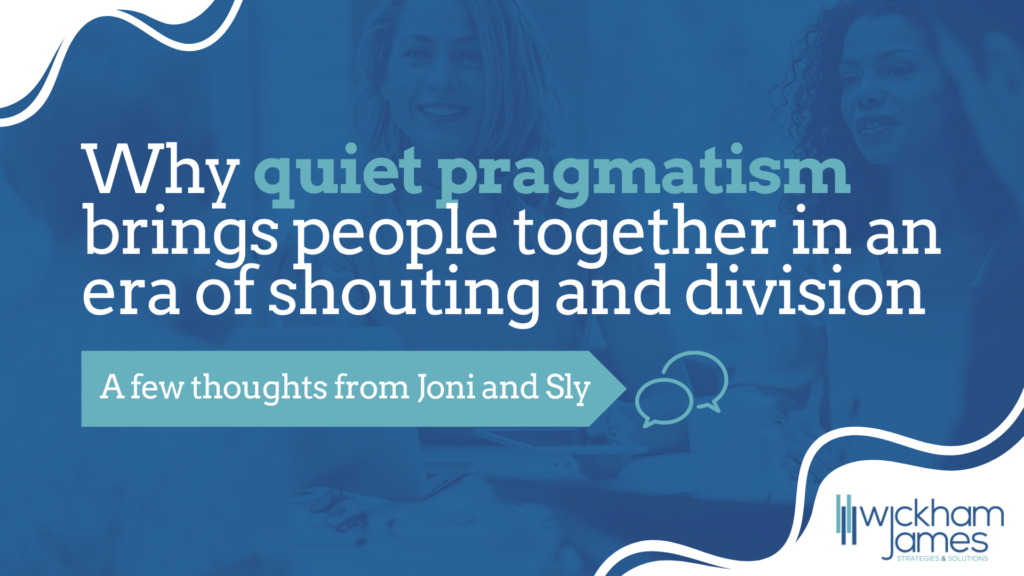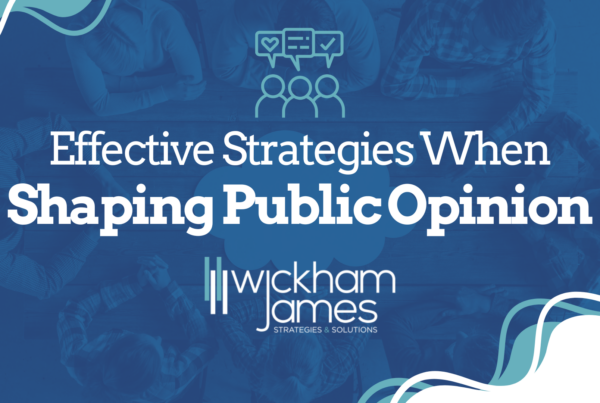 It’s a Loud World Out There
It’s a Loud World Out There
Joni – Sometimes, it seems like everyone’s always shouting in our world today.
The political season is just a series of shouted speeches, rallies, text alerts, news headlines, and social media screeds.
Is that showing up in your workplace, too? We all know that person who gets loud to get attention. And since we live in an age where getting attention is often mistaken for taking action, being loud is often rewarded.
But we want to talk about the benefits of quiet pragmatism. That may just be a fancy way of saying- sometimes it’s good just to put your head down and do the work.
Sly – Given that I was a former mayor and on the receiving end of a lot of public attention for many years – it may sound strange for me to promote the idea of being quiet and avoiding attention. But the reality is that while I was in politics, it was often frustrating to hear people talk very loudly about an issue without actually working to solve the problem.
For example, when I was trying to educate voters on the need for a new single-terminal airport, sometimes there were others in the city – council members, neighborhood leaders, business and civic leaders, social media influencers, etc. – who would talk on and on in the news media and on social media about the issue…. but who wouldn’t actually make any efforts to help create a solution.
It Pays to be Quiet
Joni – In her book, ‘My Beloved World”, U.S. Supreme Court Justice Sonia Sotomayor describes how she uses quiet pragmatism to persuade other justices. She writes, “Quiet pragmatism, of course, lacks the romance of vocal militancy. But I felt myself more a mediator than a crusader. My strengths were reasoning, crafting compromises, finding the good and the good faith on both sides of an argument, and using that to build a bridge. Always, my first question was, what’s the goal? And then, who must be persuaded if it is to be accomplished? A respectful dialogue with one’s opponent almost invariably goes further than a harangue outside his or her window. If you want to change someone’s mind, you must understand what needs shapes his or her opinion. To prevail, you must first listen.”
As you know, those who are being loud to get attention rarely stop to listen to others first. Yet that is what we sometimes need. You need to listen.
In my book, “The Thin Line Between Cupcake and Bitch”, I discuss the importance of active listening. It’s a critical communication skill that helps you check yourself and your own bias on certain issues. Good listening skills will widen your worldview. I know I’ve been grateful when I’ve come to the table with an open mind. Paying attention and deferring judgment while another person is talking is a skill that helps us broaden our perspective so that we hear what the other person is actually saying versus what we want them to say.
Active listening is also a form of quiet pragmatism—you practice being quiet, and it’s very pragmatic to really understand the other person’s perspective.
One last note – if you are doing the work while others are shouting, guess who will be ready to roll when the shouting stops? You will.
Sly – And realize that we are not saying you should ALWAYS be quiet. There are certainly times when we want to be really loud. It’s not just a mistake when we want to send a text written in ALL CAPS! We see when more shouting, more division, and more negative campaigning gets more attention in the media. Sometimes, it does change minds, but ironically, political campaigns also schedule time for positive ads to follow the negative ads in order to repair the “damage” that’s been done and to bring back people who were turned off by the negative ads.
Joni – When news anchors get coaching on their performance, one skill they learn is how to bring energy and intensity to their speaking voice without increasing their volume.
In other words – you don’t have to raise your voice to make your point. You can deliver a strong message without shouting. And if you’re tired of all the shouting, it’s likely that many others around you are also tired of it. You can bring people together by taking a different path.
How to Utilize Quiet Pragmatism
In closing, let’s summarize our top three tips to make quiet pragmatism work for you:
- While others are shouting – do the work so you’ll be ready when the shouting stops.
- While others are shouting – listen with a filter to sort out the BS from what’s real. And listen for the gaps to help you identify weaknesses and places for you to rise up while they pontificate.
- When you are surrounded by bluster, realize that quieter confidence can be your secret weapon.
What do you think? Do you have examples to share of moments when quiet pragmatism led to better results than loudness? And are you also tired of all the shouting?
Joni and Sly love sharing stories with people in person. To book them as a duo keynoter at conferences and corporate events, use this form to send your request.




